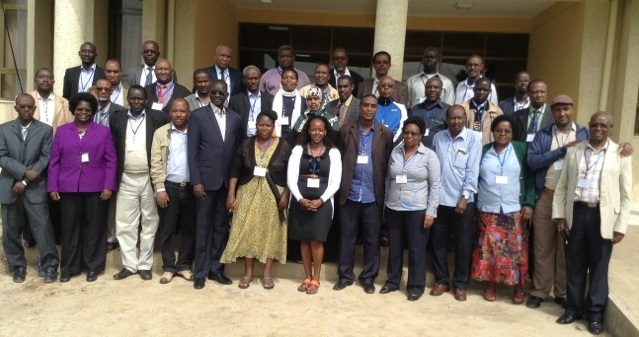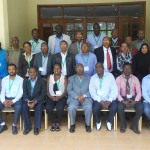Introduction
A workshop to validate the Standard Operating Procedures (SOPs) for Laboratory Tests and Testing procedures for Trade Related Transboundary Animal Diseases for Greater Horn of Africa (GHoA) region was held in Sebeta, Ethiopia between 22nd 24th July 2015. Its main aim was to harmonize the Standard Methods and Procedures (SMPs) for nine trade sensitive diseases in the Greater Horn of Africa (GHoA) this includes: PPR, Brucellosis, CBPP, FMP, SGP, Camelpox, LSD, CCPP, Rinderpest. The objective is to harmonize the animal disease control interventions developed in the region through, the development of the standard methods and procedures (SMPs). SMPs are supported with details as specified in Standard Operating Procedures (SOPs) for each subject area (surveillance, disease control, laboratory testing, sanitary certification). To operationalise the SMPs, SOPs have to be developed and agreed across the region. The major aim of the exercise is that SOPs are designed to fit the structure and capabilities of a given nation or a group of countries in a region. The main purpose of SOPs are to provide a step-by-step guide on how to carry out surveillance, control and lab tests for screening or confirmation for each trade sensitive disease. In addition, Laboratory SOPs usually lead to achievement of comparable laboratory disease diagnosis and test interpretation.
The workshop brought together the Directors of veterinary services and Technical laboratory professionals in the greater horn of Africa, AU-IBAR, IGAD, FAO and consultants from VEDAMAN.
In the opening remarks, Dr. Hiver Boussini, Animal Health Officer at AU-IBAR stated that Standards can be used as the basis for marketing, penetrating new livestock markets (both domestic and export) He explained that Modern Laboratories that carry out disease diagnostics technologies, must embrace quality management systems in order to meet international standards such as ISO 17025. Most importantly, countries that are involved in livestock trade are required to adopt the international standards in disease testing in order to meet the regulatory demands of the livestock and livestock-products importing countries .He outlined the role of SMP project in striving to establish world class standards and methods in the livestock sector.
Dr. Adan Bika, the Head of Dry land development and climate change adaptation at ICPALD, made short comments on behalf of the director of IGAD CENTER OF PASTORALISTS AREAS AND LIVESTOCK DEVELOPMENT, He pointed out that harmonizing SOPs and creating the SMPs is in line with ICPALD/IGAD mandate. He reminded the participants that the center came into existence following the regional Animal health framework developed by IGAD and Member states; indeed, another institution-ISTVS was also founded. He also explained that ICPALD is a partner in the implementation of SMP project. He emphasized that the livestock sector is of fundamental importance in the horn of Africa in terms of economy and food security and the labs are central to the well-being of the sector. It was also observed that major recent epidemics around the world are zoonotics-Ebola, mad cow, Avian and swine flu and the Labs form the first line of defense against future epidemics, hence, the need for continues improvement, which can be enhanced through regional collaboration.
In his welcome and opening remarks, the Director of the National Animal Health Diagnostic and Investigation centre (NAHDIC), Ministry of Agriculture-Federal democratic republic of Ethiopia, Dr.Meafin Sahle Forsa. Emphasised the importance of Streamlining internal operations, He explained that Standards can be used to streamline the internal processes of the Laboratory, decreasing waste, reducing procurement costs and increasing productivity. It also helps in the Innovating and scaling up of operations as well as serves as the basis for innovating the Laboratory processes. Standards also help in mitigating the risks to the Laboratories. There are needs to Comply with Regulatory Policies and meet the States ‘regulatory requirements and also ensure compliance with the national and international policies regarding disease control and surveillance, these is crucial when Creating or entering new markets.
SPECIFIC OBJECTIVES
- Discuss the role of quality management systems and livestock trade
- Discuss the implementation of quality management system for ISO 17025
- Review the status of veterinary diagnostic laboratories
- Review the harmonized SOPs
- To enhance networking of veterinary experts from the Greater Horn of Africa in support of cooperative and collaborative regional control of the TADs.
Proceedings
The workshop was conducted through presentations, plenary discussion, and group work. Facilitation was done by consultants from VEDAMAN. Hiver Boussini from AU/IBAR took the participants through the workshop Objectives and Outputs and also the role of Laboratory QMS on Livestock Trade as well as the Overview of the SMP-AH Project. Dr McOdimba, the lead consultant from VADEMAN took the participants through a Presentation on SOPs, on laboratory infrastructure and the Review of Serology Sops. The subsequent Discussion on appropriate laboratory infrastructure was facilitated by Dr. R. Masake of VADAMAN. The laboratory Technical Groups formed one team while the CVOs formed their own groups and look at the Draft SOPs in Detail, the outputs were presented in a plenary where further inputs were generated. The CVOs and Technical Groups Reviewed the Molecular Tests SOPs and the Laboratory Infrastructure respectively and these were presented in the plenary. The exercise culminated in General Discussions and Recommendations on Harmonization of Diagnostic tests. These were augmented by presentation on Tests Standardisation by AU/PANVAC, and the Standardization of Quality Control Reagents Dr. Masake. The workshop concluded by NAHDIC Laboratory Facility Tour by NAHDIC Team.
Key Discussions
The Role of Laboratory Quality Management Systems on Livestock Trade was discussed, and a note was made that, Currently, livestock sector accounts for nearly half of global agricultural economy, However, recent animal health emergencies highlight the vulnerability of this industry due to epizootic infectious diseases, Therefore, direct impact of Trans-boundary Animal Diseases (TADs) constitute a serious limitation to export of live animals and their products. The need to mitigate these Negative Impacts of TADs on Trade was agreed. It was noted that the SMP-AH project is making a vital contribution to improvement on TADs control and hence trade protection, it was also agreed that Accurate Disease Diagnosis is vital. It was generally accepted that states that want to participate in livestock trade must adapt Quality Management Systems (QMS).
The workshop achieved the following:
- Harmonized SOPs of Brucellosis, PPR, CBPP and RVF was reviewed
- Validated SOPs for Brucellosis, PPR, CBPP and RVF documents made ready for printing and publication;
- Role of quality management systems in livestock trade was discussed
- Implementation of quality management system for ISO17025 was discussed
- Status of veterinary diagnostic laboratories was reviewed
- Networking of veterinary experts from the Greater Horn of Africa in support of cooperative and collaborative regional control of the TADs was enhanced.
Recommendations
- The documentation and dissemination of the standards to be enhanced
- The labalatories collaboration to be enhanced
- A framework for joint action to be developed






